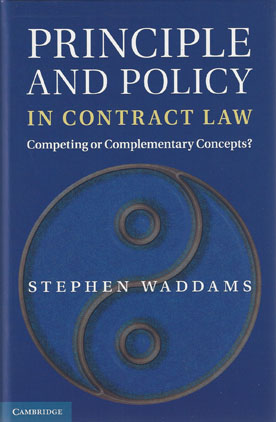
Although presented as being derived from the past, principles in contract law have been subject to constant reformulation, thereby facilitating legal change while simultaneously seeming to preclude it. Principle and policy have been mutually interdependent, propositions not usually being called principles unless they have been perceived to lead to just results in particular cases, and as likely to produce results in future cases that accord with common sense, commercial convenience and sound public policy. The influence of policy has been frequent in contract law, but Stephen Waddams argues that an unmediated appeal to non-legal sources of policy has been constrained by the need to formulate generalised propositions recognised as legal principles. This interrelation of principle and policy has played an important role in enabling an uncodified system to hold a middle course between a rigid formalism on the one hand and an unconstrained instrumentalism on the other.